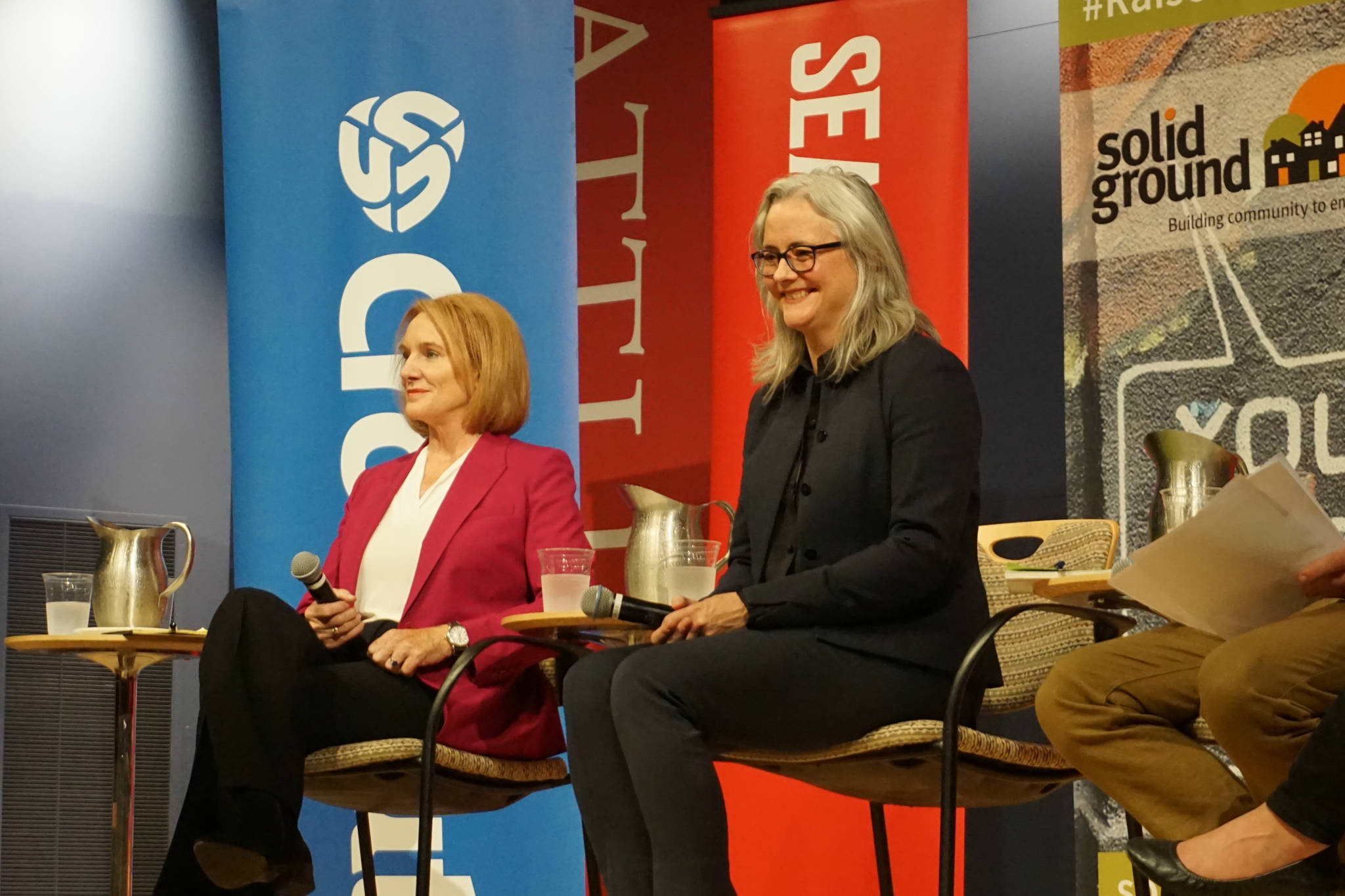With the city still coming to grips with Ed Murray’s announcement that he would be resigning in light of a new sexual abuse accusation, the two women vying to replace him in the Mayor’s Office largely avoided discussing that civic upheaval during their first one-on-one debate Tuesday night.
Instead, Cary Moon and Jenny Durkan stuck to the regularly scheduled programming and sparred over issues of housing and homelessness during the “Changing Seattle” debate at Seattle University. Over the course of the 90-minute debate, Moon pressed hard for radical changes in how Seattle deals with soaring rents, such as new taxes on the rich to pay for more public housing, while Durkan plugged more conventional tactics and questioned the practicality of some of Moon’s solutions.
The candidates agreed on many points, with perhaps the most daylight between them showing up on issues surrounding Seattle’s homeless sweeps; HALA; and efforts to dampen the effect of speculation on the city’s housing market.
On the sweeps, Moon said she was against them, while Durkan said they were often necessary.
“We need to respect people’s dignity and their right to property…I am against sweeps. We need to design a better way,” Moon said. Moon suggested it was only a “small percentage” of encampments that are “truly unsafe” and thus need to be cleared. She said the sweeps are largely driven by fears of neighbors, and that she wants to foster more compassion in the city toward the homeless.
“People are hunkered down in a me first, I have to protect myself first mode,” she said.
Durkan, on the other hand, argued that most unsanctioned encampments were inherently unsafe due to crime and sanitary issues. “We need to relocate people out of the unsanctioned encampments. They are no place for people to be living,” she said, adding that the efforts should be combined with increases in low-barrier shelter; this stance more or less represents a continuation of Murray’s current approach to homelessness.
On HALA—short for the Housing Availability and Livability Agenda, a series of policy proposals that hinges on allowing more development in exchange for affordable housing payments from developers—Durkan highlighted a comment Moon had made at a neighborhood forum last week, in which she said she would “restart the process.” Durkan said this showed a misguided approach to housing, since HALA would create tens of thousands of affordable living units. “I would not restart HALA,” Durkan said.
Moon countered that by restarting HALA, she only meant she wants to look again at the growth targets set out by the agenda to see if it does enough and properly respects people’s visions for their neighborhood; she then argued that Durkan’s affordable housing plan amounts to “rely on HALA” and private developers to provide housing. She, on the other hand, wants to look into creating capital gains taxes, increasing real-estate taxes, and better utilizing vacant city property to generate affordable housing construction.
But it was another of Moon’s proposals that generated some of the most heat in the debate. Durkan repeated earlier charges that Moon’s proposal to rein in speculation in Seattle’s housing market has racial undertones that are offensive of people of Chinese heritage. Pressed on that assertion—Moon has said Durkan is being “misleading and disingenuous” about her stance—Durkan referred back to a Stranger article Moon co-wrote with Charles Mudede in 2016 about real estate investment. In that article, the words “China” or “Chinese” are used 12 times.
“Words matter,” Durkan said.
Moon maintained that Durkan and others are misleading the public. “Folks in the Chinese community were misinformed, maliciously misinformed, possibly,” she said.
The debate was live-streamed by Crosscut and the Seattle Times on Facebook. Lots of commenters on social media noted Durkan’s propensity for not answering a question in a straightforward manner, even when they were posed as yes or no questions. For example, when Times reporter and panelist Vernal Coleman asked the candidates whether they would support an ordinance defining housing as a right, Moon said “yes.” Durkan said, “If I’m mayor I won’t need a law to tell me that housing is a human right.”
Can't @JennyDurkan answer a specific question? Not so far. #seamayor
— Mossback (@KnuteBerger) September 13, 2017
At other times, the conversation got so mired in the swamp of various homelessness programs that even the candidates got confused about what they’re talking about.
Both candidates offer what are clearly default underprepared answers in re: question about pathways home. #SEAmayor
— fattailed (@fattailed) September 13, 2017
The debate was moderated by Enrique Cerna of KCTS; along with Coleman, Crosscut’s David Kroman and The Stranger’s Heidi Groover were posing questions.
The debate was produced by Seattle University’s Project on Family Homeless and Solid Ground, in partnership with Housing Development Consortium, Seattle/King County Coalition on Homelessness and Washington Housing Alliance Action Fund. Media co-sponsors were Crosscut and The Seattle Times.
dperson@seattleweekly.com
This story has been edited to correct the list of participating organizations.








